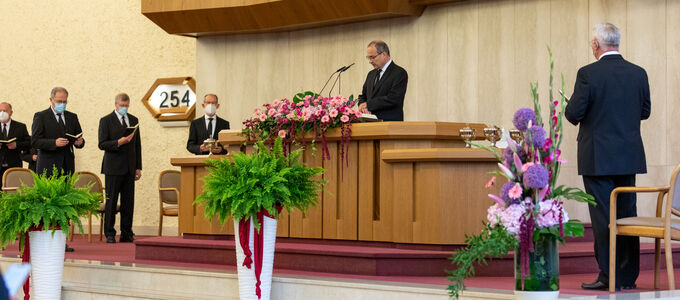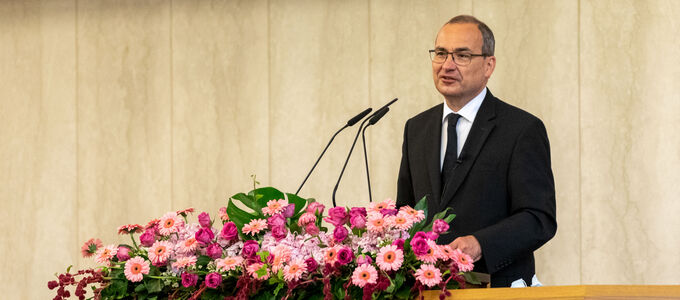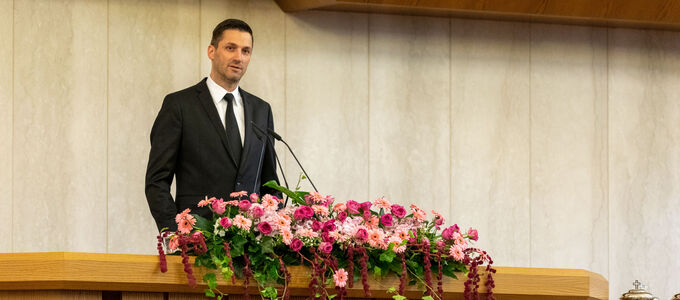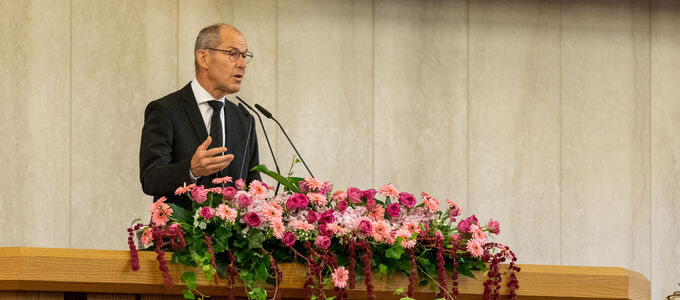
Are we really expected to constantly offer up praise and thanks? That is demanding indeed. In fact, today it comes close to a provocation. How this can be done and why it is good for us… Here are some explanations from a divine service by the Chief Apostle.
They were beaten, arrested, and thrown into prison, and ended up praying and singing hymns to God. “I don’t know if I would have reacted like that.” Chief Apostle Jean-Luc Schneider began his sermon in Berlin-Lichtenberg on 1 August 2021 with this brief description of Paul and Silas’s situation at the time.
Faith and its effects
However, the Chief Apostle said, “we are not talking about songs of praise but sacrifices of praise.” Because the sermon was based on Hebrews 13: 15–16: “Therefore by Him let us continually offer the sacrifice of praise to God, that is, the fruit of our lips, giving thanks to His name. But do not forget to do good and to share, for with such sacrifices God is well pleased.”
For what are we to continually offer up sacrifices of praise, the Chief Apostle asked and cited three examples. First, for God’s love, which became manifest through the sacrifice of Christ. Secondly, for the eternal home that is waiting for us. And thirdly, for His faithfulness: “He is always there as a loving, as a redeeming God. Jesus Christ is the same yesterday, today, and forever.”
Its inner effects
And what exactly is this sacrifice of praise? It is the concrete effect of our faith in Jesus Christ. First of all, there are the inner effects.
“Those who believe in Jesus Christ, trust in His love, His omnipotence, His promise and in His teaching. Those who truly believe in Jesus, have stability, confidence, and peace in their hearts. This is tangible. Always, no matter what.”
And then: “Those who truly believe in Jesus Christ are forward-looking. Yes, Christ is our future. They know that the best is yet to come: He will come again, He is eternal life. I am preparing myself for this. I need His word, I need His grace, I need Holy Communion.”
Its outward effects
And then there are the outward effects.
And then there are the outward effects.
For one thing: “We talk and live and act in the mind of Jesus Christ. It is not just a task we have been given. It is not a role we play, nor is it a strategy to gain members,” the Chief Apostle said. “It is completely irrelevant whether people are aware of it, whether they think it is pleasant and beautiful, or are absolutely confused and unsettled by it.”
On the other hand: “There are people who are insecure and disoriented. That is why we do well to season our speech with the salt of the gospel.” And that means: “Let’s simply convey the confidence that we know what the future holds in store for us; we have our values, and these are the values of the gospel.”
And finally: “We don’t just want to share our time and our money with those who need help. Let us also weep with those who weep and rejoice with those who rejoice.” Important is that we listen and let them talk and not interrupt them after one or two sentences: “Listen and weep with them. Listen for a change and share the happiness of those who are happy.”


























